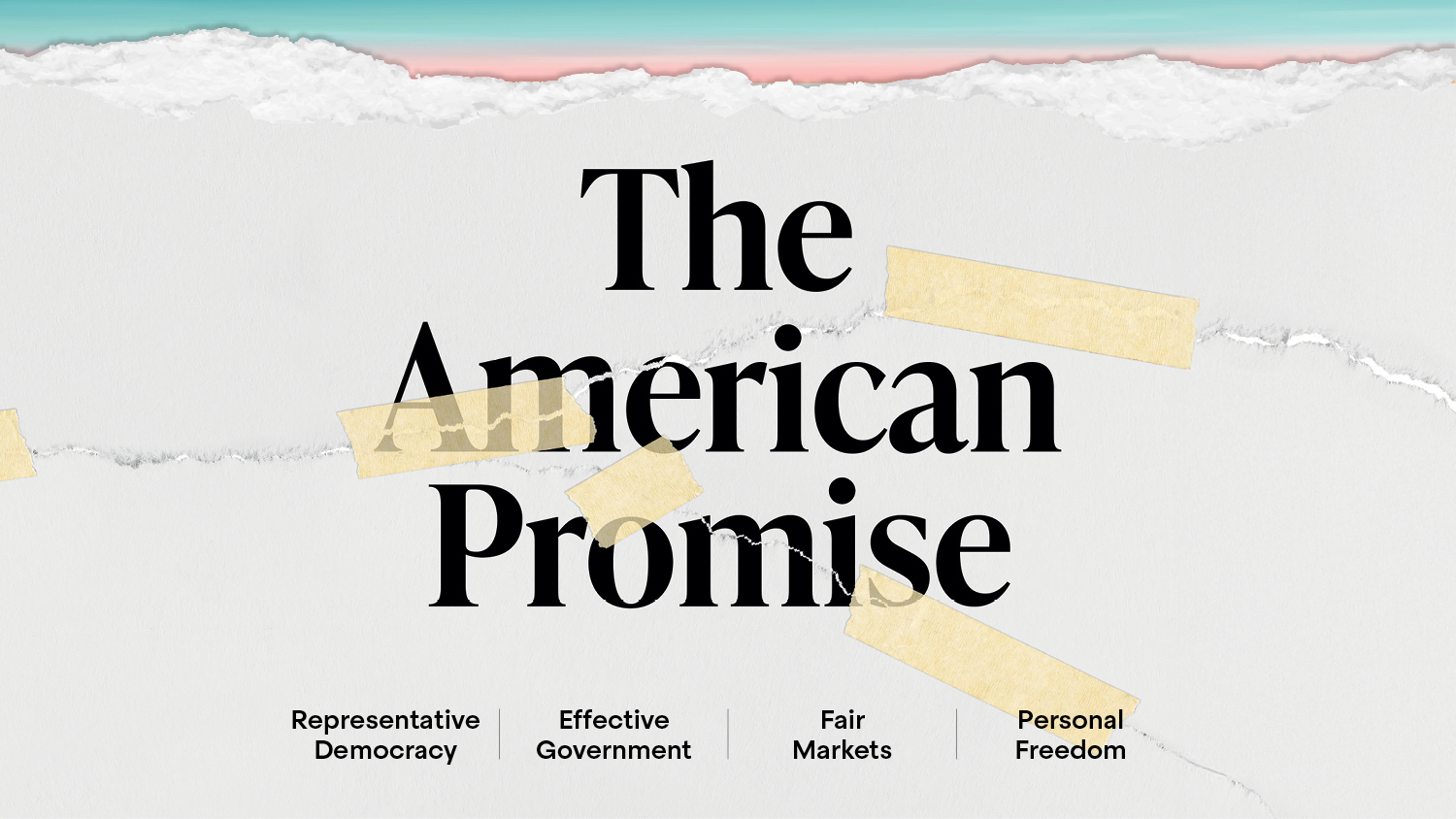Message from the Founders:
FIRST PRINCIPLES IN THE 11TH HOUR
- By Adam Pritzker & Daniel Squadron

Why have we started The States Forum? Let’s start by stating the obvious: The 250-year-old experiment of American democracy is in real danger. The Republican Party, in power in Washington, D.C., is working to dismantle it, and the Democratic Party, locked out of power in the nation’s capital, has failed to offer a compelling alternative.
The desire among too many within the Democratic Party to see the current predicament as a temporary phenomenon created by bad messaging is only dragging us further downward. After eight years of the party arguing that Donald Trump is a threat to all that America stands for, 2024 was a thorough rejection of what Democrats have been selling.
Up and down the ballot, Democratic candidates find themselves squeezed this way and that. They face pressure from groups with binary questionnaires demanding maximal outcomes, from a left flank whose agenda veers from that of a majority of voters, and from moderates who must prove they are in the party but not of it.
By every key metric of political health—popularity, power, and strategy—voters have lost faith in the Democratic Party and its brand. Only 39% of voters in battleground states believe Democrats have the right priorities, and a majority say Democrats are not looking out for working people. The Republican Party has 23 state government trifectas, where it has full control of the governorship and the legislature, compared to 15 for Democrats. The Republican hold on the U.S. Senate seems inevitable perhaps for a generation, and Democrats may reclaim the House, but by a slim margin, having more to do with the electorate’s general disdain for the state of American politics than for any positive belief about what a Democratic victory will entail.
The problems are obvious—the solutions less so. But we live in a two-party system, and the Republican party has been co-opted by corruption, disdain for democracy, and hostility to effective governance. So we have to try. The moment is too dire to simply wait and hope that someway, somehow, 2026 will be different.
The States Forum is our contribution to the much broader effort to offer ideas to fight against a destructive, anti-American movement that is increasingly dominant. We are not alone in this, nor will these ideas all be right or paint the whole picture. But we believe we have a rare perspective on the national conversation, based on what we have seen in the places we have been working:
The states.
When we began The States Project eight years ago, it was with a conviction that states were the unappreciated locus of political opportunity in American politics. More than mere laboratories of democracy, states are where government meets the people to improve lives and reinforce our shared national values.
In the 2022 midterms, while national pundits fixated on Congress, The States Project helped flip both chambers of the Michigan legislature and the Minnesota Senate, winning trifectas in those states for the first time in years; fueled a new majority in the Pennsylvania House; and came within a hair’s breadth of flipping the Arizona legislature. Last year, while the results were more mixed, even in the brutal national environment, we won key victories to hold the Pennsylvania House and broke a Republican supermajority in North Carolina, both states that went to Trump.
Overall, along with a small number of other efforts, we have dramatically increased the level of resources, quality of campaigns, and popularity of ideas deployed by Democratic state legislative candidates. In general, Democratic state legislative candidates do even worse than the top of the ticket; but in places The States Project works, candidates do not underperform.
But we know that political change is about more than simply winning elections. It is about turning values and ideals into real-world solutions for people—which is why The States Project also works with elected lawmakers to help them deliver positive change in their constituents’ lives, with local press support, connections across states, and potent policy ideas. According to research conducted by Blue Rose Research in April, among the state legislative policies tested, the top ones were overwhelmingly from our library.
We are proud to say that this work with state lawmakers is having a positive impact. But we are also well aware of just how far away we are from resuscitating American democracy and governance.
Our work in states has shown that there are clear limits to the value of good messaging and smart tactics. It would be folly for a business with a product that people neither believed in nor bought to simply change its slogan. Like any enterprise that’s unpopular, with a shrinking market share, Democrats will not succeed until they address the problem at every level: the underlying brand, the policy products it offers, and the way it distributes its ideas.
Red hat
Ask a typical American what Republicans stand for and you’ll hear a familiar list of the priorities they are pushing: small government, low taxes, strong defense, tough on crime, protecting traditional values, and opposition to “wokeness”.
And most everyone can name Trump’s slogan in 2016: Make America Great Again. (Reagan used the same one in 1980.)
In 2016, Hillary Clinton’s campaign considered 85 different slogans. If you are like most Americans, you don’t remember where they settled.
It is nearly as easy to list priorities Trump pushed in 2016: Build the wall; ban Muslims; drain the swamp.
These politically successful slogans and policies worked for their desired goal. But it is not because the messaging experts on the right are smart and the ones on the left are stupid. It is because the Republican messages and policies were built from first principles. The slogans and policies reflect a worldview with a story, rather than trying to reverse-engineer a worldview to fit the slogans.
Whether you are an opponent or an adherent, the Republican Party has excelled at defining itself: From Reagan’s “Morning in America” to Trump’s MAGA red hats, Republicans have spent decades honing a simple identity that resonates and connects to their signature policies. Trump’s slogan sums up who he is and why he is here, because it has an authenticity that people can feel and connect to specific policy goals.
For Democrats, the slogans and the policies become a muddle—a cacophony of themes that never gels into a single narrative. Voters aren’t sure what Democrats stand for beyond not being Republicans. A worldview is not a political statement. It is a precise and comprehensive set of assumptions, values, and goals that a core group of adherents believe with deep conviction. And Republicans’ better, more thoughtful connection to their worldview has allowed the Republican Party to eat the Democratic Party’s lunch.
From a slogan worldview to a brand
So, who are we and why are we here?
Like anyone, we can only answer based on our authentic beliefs and our understanding of the American electorate.
Above all else, we believe in the American Promise: It is self-evident that all people are created equal, with the right to life, liberty, and the pursuit of happiness, and that government secures these rights with the consent of the governed.
It is what Abraham Lincoln, with America torn in two, drew upon when he reminded those gathered on the battlefield at Gettysburg that they were fighting the most pernicious institution that has ever existed on American soil: “Four score and seven years ago our fathers brought forth on this continent, a new nation, conceived in Liberty, and dedicated to the proposition that all men are created equal. Now we are engaged in a great civil war, testing whether that nation, or any nation so conceived and so dedicated, can long endure.”
It is what the suffragists wrote while being excluded from the festivities at our centennial: “Our faith is firm and unwavering in the broad principles of human rights proclaimed in 1776, not only as abstract truths, but as the cornerstones of a republic.”
It is what Dr. Martin Luther King Jr. told those gathered on the National Mall in Washington: “When the architects of our republic wrote the magnificent words of the Constitution and the Declaration of Independence, they were signing a promissory note to which every American was to fall heir.”
And it is how a state senator named Barack Obama introduced himself to the nation on a New England summer’s night: “Our pride is based on a very simple premise, summed up in a declaration made over two hundred years ago, ‘We hold these truths to be self-evident, that all men are created equal. That they are endowed by their Creator with certain inalienable rights. That among these are life, liberty, and the pursuit of happiness.’ That is the true genius of America, a faith in the simple dreams, an insistence on small miracles.”
These are America’s own first principles.
We believe the American Promise is politically potent; but it is not based on political expediency. We consider it to be a self-evident truth and that to achieve the Declaration’s promise requires a commitment to four core principles:
1. Representative democracy: America at its best is the world’s strongest multiracial democracy. Democracy is the only system that imbues power in leaders while adhering to the principle that those they lead are created equal. Its power lies in uniting people across differences in a common project under a shared humanity. Diversity is a core source of our democracy’s strength, but when we essentialize differences, our pluralistic experiment cannot survive—all American citizens have a rightful say in the American experiment without being dismissed because of who they are.
2. Effective government: For government to secure life, liberty, and the pursuit of happiness to all Americans, it must respond to their concerns. Americans trusted government in the postwar period because it delivered expansions of economic equality, institutional trust, and equal rights. That trust eroded when it served incumbent interests and the powerful few. To realize its potential to expand opportunity, government must prioritize the general good over parochial interests and fight inertia to spur abundance—not to protect the status quo, narrow interests, and the most well-connected.
3. Fair markets: The free market is the form of economic organization that matches the fundamental ideals of a democratic society. But for markets to be free, they must also be fair. Left unregulated, they concentrate market power and undermine shared prosperity, opportunity, freedom, and democracy. Regulation prevents market excesses, creates a safety net for all, and ensures equality within it—not of outcomes, but of opportunity.
4. Personal freedom: Liberty and the pursuit of happiness depend on a government that protects and respects individuals’ choices and speech unless the harm to others is severe. Encouraging open, informed dialogue, allowing for heated disagreement, and tolerating a diversity of opinions, including noxious ones, protects everyone’s right to engage in a safe and functioning public square and to think and act in ways that are consistent with their own preferences and beliefs. Governmental or institutional overreach creates a poisonous cycle, and personal freedom in both the public square and private association collapse.
These are the essential principles of a strong and healthy democracy. They are also the foundation of a successful political movement; they explain who we are and why we are here. When Data for Progress polled the pillars of the American Promise in January 2024, over 80% of Americans agreed with them.
Democrats should reclaim that tradition unabashedly. That means articulating a clear narrative about who they are: the party that believes in America’s founding ideal of equal opportunity, and is willing to fight to make it real for everyone. By returning to first principles in word and deed, Democrats can forge a brand that is both positive and deeply American—a patriotism that voters can feel in their gut.
Policies built on a worldview
Of course, a brand is only as good as the products it offers. Once Democrats clarify first principles, they must offer policies that clearly connect to them and tangibly improve people’s lives.
A policy agenda that is a grab bag of single issues—however virtuous those issues may be—is the opposite of a party with a coherent worldview offering a set of products based on a brand. The Clinton slogan fiasco epitomizes much of what the Democratic Party policy apparatus has become. Democrats too often try to work backwards from a set of issues (abortion rights, labor rights, climate change, immigration, civil rights) pushed by single-issue advocacy groups—to try to cobble together a platform that is somewhat coherent.
Without that coherence, a top Democratic pollster observed to us that, “Democrats do polls to figure out what they should push; Republicans do polls to figure out how to talk about what they want to push.” While voter preferences are important in a representative democracy, simply chasing polls does not work. Voters are too smart to believe it. And studies show that they prefer a candidate they trust more than one with whom they always agree.
It is a recipe for failure.
Policies rooted in the American Promise consistently demonstrate respect for the dignity of work, the sanctity of family time, the pride of local communities, and the simple fairness of giving everyone a shot. That’s not from a poll; it’s from the first principles of life, liberty, and the pursuit of happiness for all Americans.
If this sounds like parroting Republican talking points—well, that’s a huge problem! It responds to voters’ real, immediate needs in a way that connects those needs to an authentic, core vision.
When the American Promise informs policy, when we champion higher wages, crack down on Wall Street scams, and build bridges to shorten the commute, we are honoring equality of opportunity through work. When we defend elections and count every vote, we are upholding the consent of the governed. When we have safe streets and expand access to high-quality housing and healthcare, we are securing life itself. And when we build schools that educate every kid, let people choose when and with whom to start a family, and make it easier to raise one by offering every parent paid leave, we are protecting each person’s freedom to pursue their version of happiness. That’s a set of policy products built on a brand rooted in core values.
Decentralized distribution
Even with a clear brand and product, without distribution, nothing matters. This, too, is an area in which Democrats have fallen behind. Increasingly, it’s become clear that new “town halls,” like gaming streams and Discord servers, are where many young Americans now spend their time. These digital spaces—Twitch, Discord, Reddit, TikTok—function as digital municipalities, each with their own influencers, local norms, and economies. But while Republicans have moved quickly to occupy these spaces, Democrats have largely stayed absent.
The results are measurable: 37% of Americans under 30 now get their news from influencers—most of whom lean right. In 2024, men under 30 swung 14 points to Trump. These platforms aren’t just entertainment—they represent the new grassroots. And, like any movement, they influence the culture downstream. In an era of programmable media—algorithmic feeds, chatbots, and token networks—whoever controls distribution programs culture, and, of course, politics. If Democrats cannot penetrate this ecosystem, even their most inspiring policies will be drowned out.
It should go without saying, but we cannot simply ignore the reality of new technologies and their cultures, whatever instinctive reaction they may elicit. TikTok and Twitch creators—which means any user that posts—can earn real money from tips and gifts from fans. Blockchain-based social networks reward influence and engagement directly with digital tokens, which means something very real to the 1 in 5 Americans who own cryptocurrency tokens. In these ecosystems, a compelling meme or video isn’t just persuasive—it’s profitable. That creates powerful incentives for ordinary people to spread messages that travel, and to ignore ones that don’t.
Republicans have recognized and exploited this reality. President Trump has appeared on Twitch streams and at Bitcoin summits. GOP congressmen join YouTube gaming shows. Conservative groups like Turning Point USA and The Daily Wire fund and elevate influencers as if they were precinct captains.
To compete in this evolving landscape, Democrats need more than good content. They need an infrastructure to deliver it—in the ways that products and ideas are injected into the culture today to meet people where they are. A modern information infrastructure must be capable of navigating viral currents and crypto economies alike. Success depends on acknowledging that message and medium are inseparable. To fight for democracy in the 21st century, Democrats must update, decentralize, and democratize their approach to communication.
States are decentralized distribution hubs themselves, with thousands of authentic voices serving in state legislatures and other offices. Each has the ability to spur organic, localized engagement in their corner of the digital distribution network.
By rooting a message in local contexts and creating more opportunities for organic uptake by influencers and creators, state leaders can create a foundation for the national brand—and maybe even change it. It’s a federated approach to narrative for our times.
The States Forum
States offer the best chance for anyone who envisions a different future for America. Here, it is possible to rebuild a brand by committing to first principles, crafting and enacting the best policies, and spreading a tangible message through local messengers who wield modern, decentralized tools.
None of this will be easy.
In this journal, and through the network we are building, we are seeking to prompt deeper thinking about how much a return to core principles with a better brand and more appealing policy offerings can happen in states, and how decentralized distribution will supercharge its potency.
What you will read in these pages and online are creative and provocative ideas about what states can be doing to align with the four principles of the American Promise. Will all of the ideas in this journal become law? No. Should they? Certainly not all of them. But we believe that having this discussion, and encouraging more people to think about what we can and should be doing in states to solve our deeper issues, is vital.
Ultimately, this is not about winning the next election. It is about renewing the American Promise itself—which also happens to be the best way to win the next election.
Successful politics must begin with self-evident first principles—a worldview that explains core beliefs and why they matter. And building anything that lasts requires applying another set of first principles: brand, product, and distribution. States are the best place to start.
That’s why we started The States Forum.
About The Author
Adam Pritzker is an entrepreneur and investor focused on business, politics, and civics. He cofounded General Assembly, Khaite, Wholestack, The States Project, and The States Forum. A Columbia graduate, Adam serves as a trustee and board member of the Columbia University Investment Management Company.
Daniel Squadron is a cofounder and president of The States Project and The States Forum. In 2008, he was elected the youngest member of the New York State Senate, serving until 2017. He cowrote Chuck Schumer’s Positively American, worked in politics, and owned a bar.



